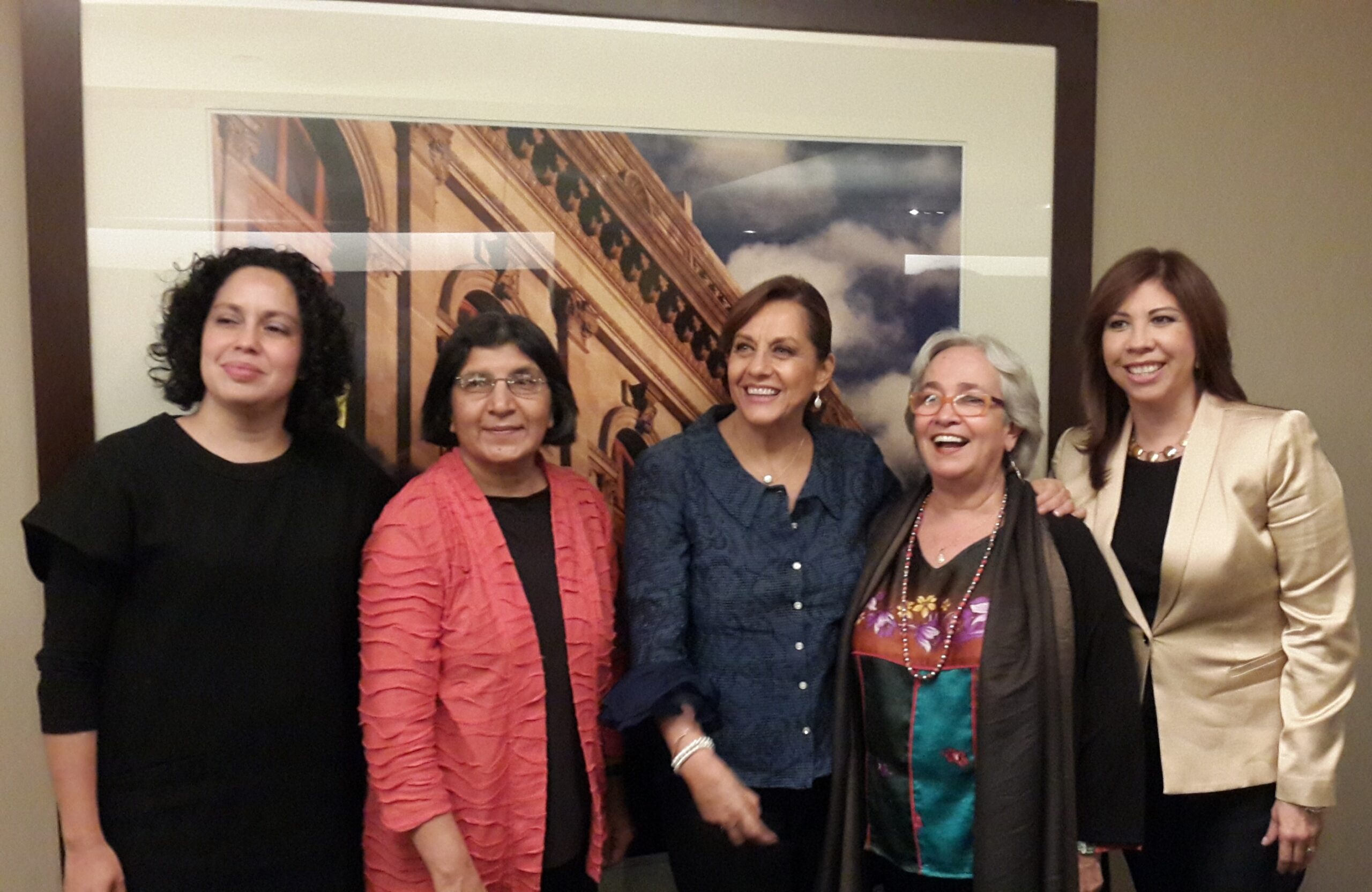Mexico City, July 21, 2014 — Nine years after the last official visit to Mexico from the United Nations Special Rapporteur on violence against women, JASS organized an unofficial visit from current Special Rapporteur, Rashida Manjoo, in Mexico City on July 9-10, 2014. Independent Expert Alda Facio, member of the UN Working Group on the issue of discrimination against women in law and in practice, also participated in the events alongside Ms. Manjoo.
Violence against women in Mexico typically resembles only the tip of an iceberg with more systemic and complex problems lurking below the surface,” stated the UN Special Rapporteur on violence against women in her mission report to Mexico in 2006.1
While Ms. Manjoo’s visit to Mexico was unofficial, it served as a useful benchmark to currently assess Mexican women’s access to a life free of violence. Ms. Manjoo reminded us that “violence against women is a barrier to effective citizenship.” This is of particular importance since it appears that eliminating violence against women is never a top priority for the Mexican government. “There’s always something more important than eliminating violence against women,” stated Ms. Facio.
Weak political will surrounding gender equality is compounded by a general lack of knowledge among functionaries, judges and police regarding domestic and international mechanisms to protect women from violence. These factors have made it difficult for the Mexican State to fulfill its obligation to prevent and eradicate violence against women, as mandated in the Mexican Constitution as well a number of international instruments such as the UN CEDAW and the Organization of American States (OAS) convention Belém do Pará.
“The state condones violence when it fails to protect and prevent violence against women,” highlighted Ms. Manjoo.
The current human rights situation for Mexican women has reached crisis levels. As the representative of the UN High Commissioner for Human Rights in Mexico highlighted in a meeting with civil society groups, women do not just suffer one form of violence but rather from multiple and intersecting forms of violence. In the general landscape of Mexico’s militarization over the past eight years along with alarmingly high rates of impunity, women’s access to justice is greatly impeded. This is especially true for women human right defenders who face additional violence and barriers to justice.
JASS co-organized three public events and a closed meeting with Ms. Manjoo and Ms. Facio where more than 40 women human rights defenders from different regions of Mexico were able to share their experiences directly with the experts. The three public events, which convened human rights experts, public institutions officials and civil society groups, were meant to critically address state responsibility and international standards—including the UN Resolution on protecting women defenders and the UN CEDAW—to prevent and sanction violence against women as well as to analyze due diligence standards as a tool for women to hold the state accountable. To ensure government engagement and follow-up, the events were co-hosted with the national women’s institute, CONVAIM, Mexico’s Supreme Court, and the Norwegian Embassy in Mexico.
A salient theme from the activities was one of frustration over the gap between policy and practice. Although Mexico has made important advances in the institutionalization of women’s human rights through new federal legislation, commissions, institutions, senate committees and one-stop shops for victims of violence, advances in the law are often accompanied by poor implementation. “It’s been three steps forward and five steps back since the 2006 report,” lamented a participant during one of the events with civil society groups.
The two distinguished independent United Nations experts’ brief yet important visit to Mexico as UN representatives is important for the women’s human rights movement in Mexico and was possible thanks to the support and coordination between JASS Mesoamerica, UN Women, the UN Office of the High Commissioner for Human Rights, the Mexican Supreme Court, the National Commission to Prevent and Eradicate Violence against Women (CONAVIM) and the Embassy of Norway in Mexico.
JASS is pleased that their presence attracted strong media coverage which helps raise awareness about Mexico’s human rights crisis as well as amplify the voices of women human rights defenders. But perhaps more importantly, their participation in these events presented a unique opportunity for state and civil society actors to collectively reflect analyze and better understand the reach of human rights protection instruments for women in Mexico.
Additional information:
Statement by civil society: A 8 años de publicado informe sobre derechos humanos de las mujeres en México, regresa Relatora Especial sobre la Violencia contra la Mujer de la ONU
Norwegian Embassy in Mexico: Protection for Women Human Right Defenders.
For more information, please contact JASS’ Mexico Coordinator Cristina Hardaga Fernández at: cristinahf.jass @ gmail.com.
1 Integration of the Human Rights of Women and a Gender Perspective: Violence Against Women Report, UN Special Rapporteur on violence against women, its causes and consequences, Yakin Ertürk Addendum, Mission to Mexico. Parr.7.


























